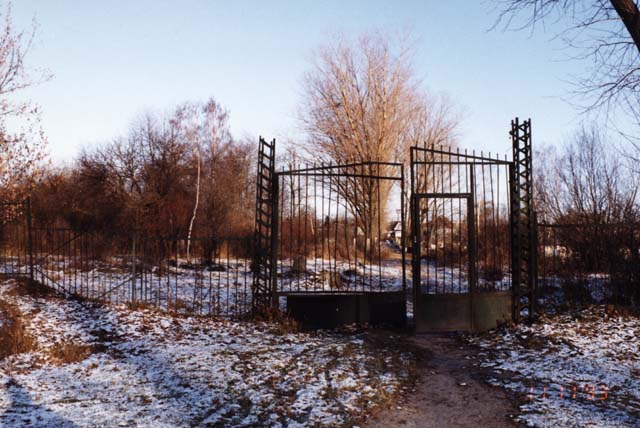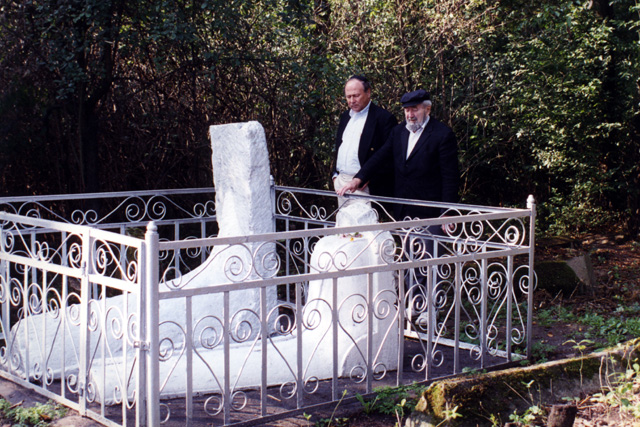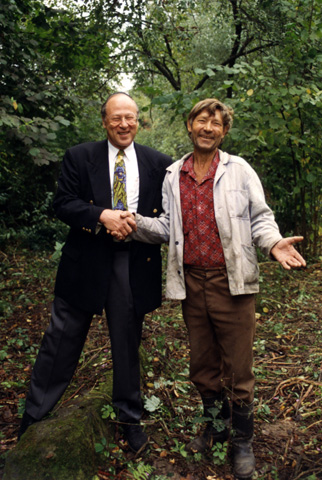THE JEWISH CEMETERY IN NOVOGRAD VOLYNSK

|
THE JEWISH CEMETERY IN NOVOGRAD VOLYNSK |
 |
 |
|
Entrance to the old Jewish Cemetery in Novograd
Volynsk. |
Baruch and I went to the old Jewish cemetery in Novograd Volynsk. The cemetery was overgrown and the Nazis and Ukrainians had removed many tombstones for use in road building. Chickens were permitted roam freely and forage among the graves. It was upsetting to see the graveyard in such deplorable condition.
According to Jewish tradition, the old cemetery was divided into two major parts: one for men, the other for women. Within these sections the people (except for prominent rabbis who got their own gated sections) were buried sequentially by year and date of death.














|

In a fenced-in section, we found the graves of two of our famous ancestors, Rabbi Mordechai Goldman (1824-1900) and his father Rabbi Yechiel Michel Goldman, son of Moshe (1788-1854).
In the womenís section Baruch and I searched diligently for Gittelís grave. My mother had paid for a new marker for the site when she visited Novograd Volynsk during her honeymoon, so we figured that it would stand out from the older markers. We came upon gravestones that were placed within a year or two of Gittelís death, only to discover that the markers for her year had been uprooted and probably used to pave roads. This was quite a disappointment, especially for Baruch.
 |
|
Paul with Vigory, the head groundskeeper at the Novograd Volynsk cemetery |
Baruchís health was failing and I didnít realize this at the time. Sometimes he
would grab onto me very tightly and on other occasions I actually held him up.
Within the year he was diagnosed of pancreatic cancer. But at the time I assumed
that he was emotionally overwhelmed.
The poor condition of the cemetery distressed me so much that I asked Vitaly
about hiring somebody to clear it. I also wanted the fallen gravestones returned
to their upright position so the markers could be read. Vitaly spoke to Vigory,
the cemetery caretaker, and they agreed on a price of a few hundred dollars.
However, it was soon recognized that this was too big a task for Vigory alone
and he asked if he could hire a couple other workers to help him. This sounded
reasonable and we upped the price to $500.
I had a good feeling about this friendly man. Vigory wore a yarmulke out of
respect and asked permission to burn wood and other debris on the cemetery
grounds where there were no grave markers. In the weeks that followed our visit,
he and his helpers cleared out and burned much of the overgrowth and fallen
trees.
I wondered if $500 was sufficient remuneration but Vitaly assured me that
workers in the area normally earned about $30 a month. For the three months or
so that it took Vigory and his team to complete the job they would be earning
significantly more than usual.
A newer section of the cemetery is in use by the entire population. The more
recent graves have images of the deceased etched on the markers. This is common
among both the Jewish and Gentile populations.
There were tombstones of other Goldmans in the cemetery but the relationship of
these Goldmans to Paul Gassís family is unknown.
VITALY CHUMAK, THE MIRACLE WORKER
Throughout our travels Vitaly smoothed the way at every obstacle and tried to
meet the special requests and schedule changes that my uncle and I piled on
himónot an easy matter given the dearth of local services. For example, Baruch
was quite unhappy about the water pressure problem in our hotel room. So Vitaly
arranged for Baruch to have a shower in a private home.
Baruch and I lacked protein in our diets because we eat only kosher meat. In
Ukraine the standard fare is greasy pork, and fish products that would be
considered fish bait by American standards. Vitaly understood the problem and
one day, he rose early and tracked down the owner of the chickens that grazed in
the Jewish cemetery. He convinced the owner to sell him the eggs. Vitaly also
found freshly made goat cheese and milk. The resulting breakfast was delicious.
In Ukraine, if you have American dollars, you can purchase luxury items such as
VCRs, televisions, and cars. If you donít have money, you have an extremely
difficult time just putting food on your plate. Every day is a struggle. Few
jobs are available, especially for Jews, and what is available pays poorly. We
found that in general, government officials dressed in expensive suits but the
typical man or woman on the street was dressed shabbily.
People earn a living in strange ways. For example, in the bigger cities, there
are lots of policemen. Each appears to be assigned to certain areas. The
policemen are constantly writing tickets and the people are constantly paying
them off. Once Vitaly was pulled over in the countryside for speeding. Vitaly
got out of the car and as he chatted in a friendly manner, he pulled out his
wallet and handed over some cash to the officer. Afterward, Vitaly commented
that public officials didnít get paid enough to support their families so he
didnít mind the payoffs.



[1] [2] [3]
[4] [5] [6]
[7] [8] [9]
[10]